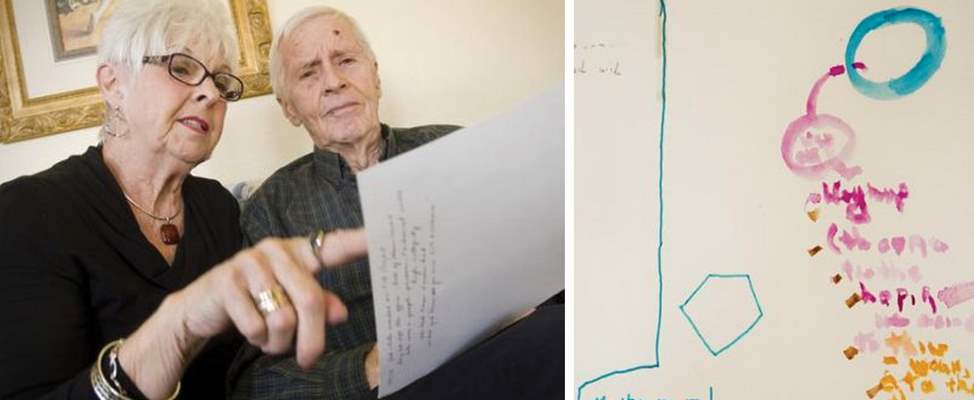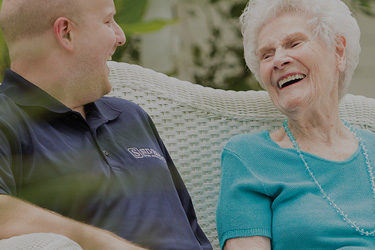
O.C. REGISTER – May 14, 2014 – Some mornings, they’d wake up and he’d be gone.
They had a phone number to call in emergencies, and knew he worked on top-level military projects that included overseeing the Air Force base where the Space Shuttle Challenger exploded in 1986.
But most times, Nathan Lindsay’s family’s only clue about what his official duties might be lie in how his palms felt the night before.
“His hands would sweat the night before a launch,” said his wife of 56 years, Shirley Lindsay.
That secrecy remained intact after he retired as a major general in 1993. But one day last year, nearly a decade after doctors diagnosed Nathan with dementia, an unexpected clue to his past emerged at the memory care center in San Juan Capistrano that he now calls home.
It was a depiction of a flight plan similar to those he drafted so many times while leading top-secret rocket launches and spy satellite missions. Lindsay painted it on a white sheet of paper during a Memories in the Making session at the Silverado Memory Care Community, where he and 95 other people with forms of dementia like Alzheimer’s disease live.
He’d never done it before and he never did it again, but the painting has provided his family a rare look at a world they weren’t allowed to know anything about.
And while the dementia that has taken over his brain has erased many of his memories, it also has brought to the surface long-buried thoughts and experiences he spent 40 years compartmentalizing.
“We’re learning a lot more now,” said Shirley Lindsay, sitting at Silverado last week with her husband and their daughter, Lori Lindsay Smith. “Stuff we would have never known.”
A CLASSIFIED BACKGROUND
Born in Monroe, Wis., Nathan Lindsay earned a bachelor’s degree from the University of Wisconsin before joining the Air Force in 1959. He spent most of his 34-year career in classified military intelligence.
He and his family spent four years living overseas – Libya and Germany – before moving to Florida, where he was director of operations support and interrogations in the Space Systems Division, then assistant deputy commander for space operations. In 1986, he was appointed to the West Coast as deputy commander of launch and control systems at Air Force Space System Division, where he’d previously served as an assistant. He also served as a program director with the National Reconnaissance Office, which designs, builds and launches spy satellites, from 1987 to 1992.
Through it all, his family knew little of what he did.
“A black car would pull up in the night, and away he’d go,” Shirley said. “The kids just got used to it. It was just our life.”
Shirley led a support group for women with husbands working secret jobs in military intelligence. She and her children became so comfortable with his unexpected absences, that life didn’t seem extraordinary. And not everything was secret.
They knew he led the investigation into the explosion of a Titan 34D rocket after liftoff from Vandenberg Air Force Base in California in April 1986.
They also knew a bit about his work in the Challenger investigation – they saw him talk to Peter Jennings on ABC News, and read the articles in which he served as a military spokesman after the tragedy. As commander of the Eastern Space and Missile Center at Patrick Air Force Base in Florida, Nathan also oversaw the casualty affairs officers that organized funerals for the Challenger astronauts and crew.
“I’d never seen thousands of people go through a grieving process before,” Nathan said in a Feb. 19, 1986, Orlando Sentinel article.
He also oversaw the recovery of thousands of pieces of evidence, including body parts.
“He saw everything that came in,” Lori said.
‘A WORLD WE KNEW NOTHING ABOUT’
Lori lives in Newport Beach, and Shirley splits her time between Orange County and their home in Colorado. The younger Nathan has run marathons to raise money for Alzheimer’s research. Another of the Lindsays’ children, Susi, is one of two ambassadors for the Alzheimer’s Association in Nevada.
They visit Nathan regularly and say they’re pleased with the top quality care he’s receiving. They’re also regularly surprised to learn more about his once top-secret career. They’d learned a few secrets here and there – Shirley remembers unpacking coffee mugs when they moved to their eventual retirement home in Golden, Colo., in 1997. Several said “mission director” on them and commemorated launches.
“It was a world we knew nothing about,” Shirley said. Then a few years ago, the CIA commended him for his service. Another surprise. “I had no idea he worked for the CIA,” she said.
But she has learned much more in the last few years from old military friends and colleagues who visit him at Silverado.
“The only reason we hear about some of it now is a lot of it has been declassified,” his daughter said.
So when a Silverado art teacher alerted Shirley to her husband’s painting of a flight plan, she knew it was an unusual look at a firsthand memory from her husband’s secret past.
“It was clearly a repressed memory,” said Carole Shaw, Silverado’s administrator.
Shirley showed it to a retired two-star general who worked with Nathan. He identified it as a replica of a readiness launch plan for a top-secret rocket launch.
“When he saw it, he said, ‘I know exactly what that is because I sat in on the briefings that your husband gave,’” Shirley said.
Nathan rarely speaks, and his family said he doesn’t do well with more than a few visitors. But he loves hearing his family discuss his life. A friend and ex-military colleague told his life story at his birthday celebration last year, and Nathan’s facial expressions showed how much it meant to him, Shirley said.
Shirley and her children will gather at Silverado for Nate’s 78th birthday May 24. They’ll strive to ask him questions about his life that stimulate his mind and remind him of who he is. And Shirley will continue trying to help doctors learn from her husband’s experiences as the family continues to be surprised at all there is left to know about Nathan.
“These are the joys that we’re getting now,” she said.
Now his doctors wonder if he might have post-traumatic stress disorder from those memories. Long buried in the back of his brain, it’s possible some of those memories are emerging as dementia lessens his mental capacity.
“It has nowhere to go, so it’s coming forward,” Shirley said.
A TROUBLING DIAGNOSIS
Nathan has been living at Silverado since June 2011. He was diagnosed with dementia in 2005, about six years after their oldest son first noticed something amiss. Shirley thought it was retirement. Once happy and easy to get along with, her husband started yelling at her, and his moods changed drastically. Then at Thanksgiving in 2004, all four of their children said, “What’s wrong with dad?”
Dr. Torsten Kruse, Silverado’s medical director, has helped Lindsay’s family understand how dementia affects his behavior, and how it can provoke outbursts like those they endured early on. He also helped them connect some of his unexpected behaviors to his secret past. When he rushed to his wife and told her to hide when employees used a staple gun to hang Christmas decorations, he was reacting to his time spent overseeing satellites that gave him access to warfare. Or to the huge explosions he witnessed during the Challenger and Titan tragedies.
“He built the satellites and the rockets that were able to take pictures of what was happening,” Shirley Lindsay said. “It’s stuff we’re still kind of trying to find and look at so we can maybe help other people.”
When the Space Shuttle Columbia disintegrated in 2003, Nathan called his son, Nathan Lindsay Jr., an Air Force colonel in Virginia.
“I’ll never forget the tears in my father’s voice when he called to tell me to turn on the TV,” his son told the Connection Newspapers last year. “Dad rarely cried, but I knew he was reliving the Challenger incident.”
Shirley has given Kruse a detailed written history of her husband’s life and is eager to help as doctors look for ways to help Alzheimer’s patients deal with once-repressed memories.
“Every time I hear another story, we take it to the doctors, not only for Nate, but so the doctors can help other people,” Shirley said.
Read full story here.


